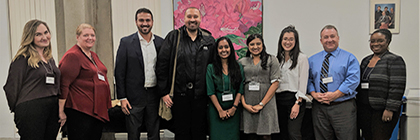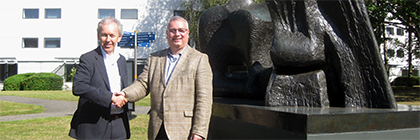As a new year emerges, YFile takes a look back on 2019 to share with readers a snapshot of the year’s highlights. “Year in Review” will run as a four-part series and will feature a random selection of top news stories published in YFile. Here are the stories and highlights for October to December 2019, as chosen by YFile editors.
October
Osgoode Professor Emeritus John McCamus co-recipient of 2019 Justice Medal
The Canadian Institute for the Administration of Justice (CIAJ) has announced its Justice Medal Award will be jointly awarded to Osgoode Hall Law School Professor Emeritus John McCamus and Patrick J. LeSage, former chief justice of the Ontario Superior Court of Justice.
York University vision scientists disprove 60-year-old perception theory
Vision researchers at York University have disproved a long-standing theory of how the human vision system processes images, using computational models and human experiments.
New Joan and Martin Goldfarb Art Gallery will help others find their passions through art
For Joan and Martin Goldfarb, art has always been a major passion and a significant part of their lives. Now they are on a mission to help others find their own passion through art by contributing $5 million to build a new art gallery on Keele Campus.

York chemistry professor receives Petro-Canada Young Innovator Award
Chemistry Professor and Tier II Canada Research Chair Chris Caputo in the Faculty of Science has received the 2019 Petro-Canada Young Innovator Award. The award is presented to outstanding early-career faculty members at York University and is a commitment by Petro-Canada (now Suncor Energy Inc.) and the University to encourage excellence in teaching and research that will enrich the learning environment and contribute to society.
November
‘The Economist’ ranks the Schulich School of Business No. 1 in Canada
The Economist magazine has ranked the MBA program at York University’s Schulich School of Business No. 1 in Canada in the magazine’s annual survey of the world’s top 100 MBA programs.
Writer and scholar Jesse Thistle headlines 2019 Kitty Lundy Memorial Lecture
The 2019 Kitty Lundy Memorial Lecture will be presented by best-selling author and scholar Jesse Thistle, author of the memoir From the Ashes: My Story of Being Métis, Homeless, and Finding My Way (2019). Thistle’s talk will be followed by a discussion with panellists Shane Belcourt, ShoShona Kish and Jesse Wente.

Lions football player Jacob Janke wins U SPORTS Russ Jackson Award, named all-Canadian
York University Lions football player Jacob Janke was named the recipient of the U SPORTS Russ Jackson Award on Nov. 21 as the national award winners and all-Canadians were celebrated at the annual Vanier Cup gala. Janke is the first-ever York recipient of the national award.
York U researchers play major role in advancing autonomous rail travel
Professor Gunho Sohn from the Department of Earth and Space Science and Engineering in the Lassonde School of Engineering is playing a major role in advancing autonomous transportation through a cutting-edge autonomous train research project.
December
The Art Gallery of York University wins major awards and accolades from OAAG
The Art Gallery of York University (AGYU) swept the 2019 Ontario Association of Art Galleries (OAAG) Awards of Excellence, and took home seven awards out of the 25 awards presented, including a special accolade for Interim Director/Curator of the AGYU, Emelie Chhangur, who received the OAAG’s inaugural Changemaker Award.

MEd student Collette Murray wins Neighbourhood Arts Network Community Arts Award
Faculty of Education master’s student Collette Murray was awarded the 2019 Community Arts Award by Toronto Arts Foundation’s Neighbourhood Arts Network. The $10,000 award, sponsored by MOD Developments, was presented to Murray recently at a reception at the Power Plant Contemporary Art Gallery.
Introducing the 2019-20 cohort of York University President’s Ambassadors
York University has announced the students selected to participate in the second cohort of the President’s Ambassador Program. This diverse group of multi-talented undergraduate and graduate students are engaged York community members who will share their commitment for the University through various institutional events and initiatives.
Research on cloud computing earns award 10 years after publication
Professor Marin Litoiu, from York’s Lassonde School of Engineering, along with an interdisciplinary group of colleagues, have received the Most Influential Paper award for research on cloud computing that was published 10 years ago.
This concludes the Year in Review 2019 edition.





















